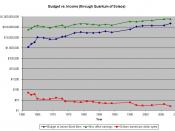As Gowthorpe (2003: P457) argued, that "A budget is a plan, expressed in financial and/or more general quantitative terms, which extends forward for a period into the future." Budgeting actually refers to the process that, after the strategic plan of the business has been made, companies made a short term plan (usually one year) to meet the strategic purpose. Traditional budgeting has offered a lot of contributions in so many years' practice. But it seems it is more and more unsuitable for the modern business. In this paper, I will give a brief induction for traditional budgeting; and then discuss the strengths and weaknesses of the traditional budgeting; last I will explain and evaluate the alternative.
Every business leader wants competitive success, the best management team, continuous innovation, low costs, loyal customers, and high standards of corporate governance and control. The benefits of great business planning are obvious - better use of capital, more efficient operations and many other.
According to the article on FT, the indexes of traditional budgeting include: product profitability, department costs, unit sales, and capital efficiency ratios.
Richard Barrett, VP of International Marketing at ALG Software, comments, "The annual budget is still the most widely used performance management process and the primary tool for controlling expenditure and setting performance targets." Generally speaking, the objectives of budgeting are as following:
1. Budgeting report provides information to determine whether current-year revenues were sufficient to pay for current-year services.
2. Budgeting report demonstrates whether resources were obtained and used in accordance with the entity's legally adopted budget.
3. It also demonstrates compliance with other finance-related legal or contractual requirements.
4. Budgeting report provides information to assist managers in assessing the service efforts, costs, and accomplishments of the organisational entity.
Over the past 30 years, governmental entities and organisations have...



The strengths and weaknesses of the traditional budgeting
Good strong essay with back up points, well done.
3 out of 3 people found this comment useful.